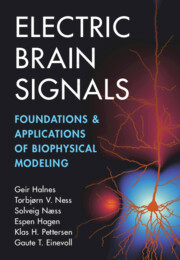Book contents
- Frontmatter
- Dedication
- Contents
- Preface
- Reserved Physical Symbols and Quantities
- Abbreviations
- 1 Introduction
- 2 Charges, Currents, Fields, and Potentials in the Brain
- 3 Neural Dynamics
- 4 Volume-Conductor Theory
- 5 Conductivity of Brain Tissue
- 6 Schemes for Computing Extracellular Potentials
- 7 Spikes
- 8 Local Field Potentials (LFPs)
- 9 Electroencephalography (EEG)
- 10 Electrocorticography (ECoG)
- 11 Magnetoencephalography (MEG)
- 12 Diffusion Potentials in Brain Tissue
- 13 Final Comments and Outlook
- Appendix A Frequency-Dependent Length Constant
- Appendix B Derivation of the Current-Dipole Approximation
- Appendix C Electric Stimulation
- Appendix D Derivation of the Point-Source Equation for Anisotropic Medium
- Appendix E Statistical Measures
- Appendix F Fourier-Based Analyses
- Appendix G Derivation of Formulas for Population Signals
- Appendix H Equations for Computing Magnetic Fields
- Appendix I Derivation of the MC+ED Scheme
- References
- Index
8 - Local Field Potentials (LFPs)
Published online by Cambridge University Press: 30 May 2024
- Frontmatter
- Dedication
- Contents
- Preface
- Reserved Physical Symbols and Quantities
- Abbreviations
- 1 Introduction
- 2 Charges, Currents, Fields, and Potentials in the Brain
- 3 Neural Dynamics
- 4 Volume-Conductor Theory
- 5 Conductivity of Brain Tissue
- 6 Schemes for Computing Extracellular Potentials
- 7 Spikes
- 8 Local Field Potentials (LFPs)
- 9 Electroencephalography (EEG)
- 10 Electrocorticography (ECoG)
- 11 Magnetoencephalography (MEG)
- 12 Diffusion Potentials in Brain Tissue
- 13 Final Comments and Outlook
- Appendix A Frequency-Dependent Length Constant
- Appendix B Derivation of the Current-Dipole Approximation
- Appendix C Electric Stimulation
- Appendix D Derivation of the Point-Source Equation for Anisotropic Medium
- Appendix E Statistical Measures
- Appendix F Fourier-Based Analyses
- Appendix G Derivation of Formulas for Population Signals
- Appendix H Equations for Computing Magnetic Fields
- Appendix I Derivation of the MC+ED Scheme
- References
- Index
Summary
The local field potential (LFP) is the low-pass filtered extracellular potential recorded inside brain tissue. Unlike spikes, which reflect neuronal action potentials and thus the output of neurons, the LFP is believed to predominantly reflect the synaptic inputs to neurons. Here, we use computer simulations and approximate analytical formulas of LFPs from single neurons and populations of neurons to give a comprehensive overview of the various factors that can contribute to shaping the LFP and its frequency content. We consider the effects of neural morphology, intrinsic dendritic filtering, synaptic distributions, synchrony in synaptic inputs, the position of the recording electrode, and possible contributions from action potentials, calcium spikes, NMDA spikes, and active subthreshold dendritic ion channels.
Keywords
- Type
- Chapter
- Information
- Electric Brain SignalsFoundations and Applications of Biophysical Modeling, pp. 187 - 240Publisher: Cambridge University PressPrint publication year: 2024

